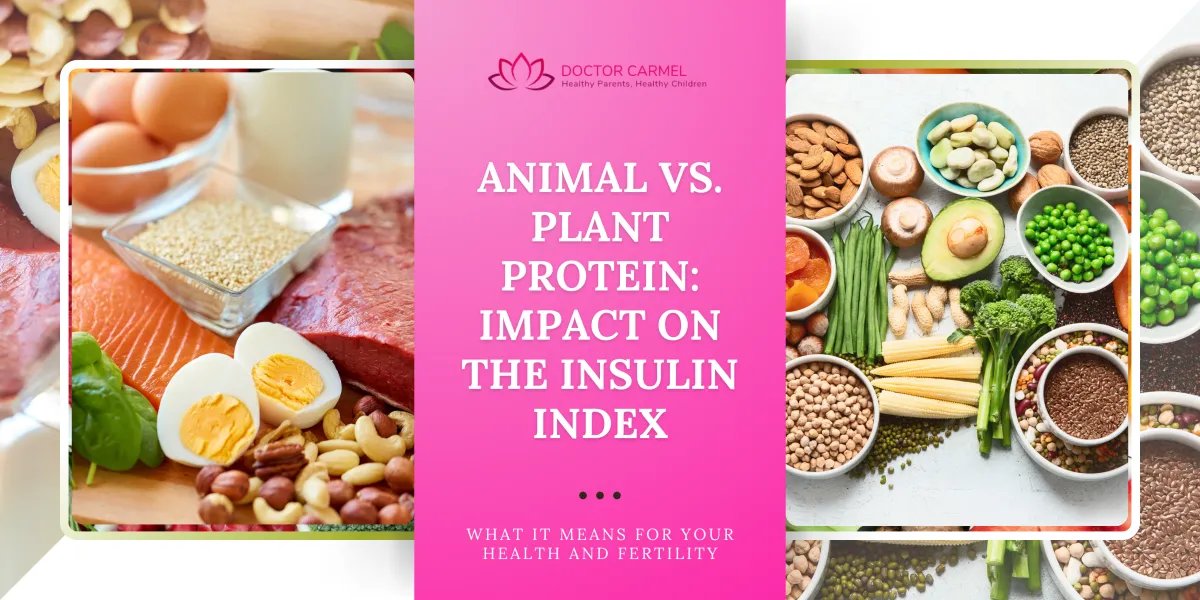
Animal vs. Plant Protein: Impact on the Insulin Index — What It Means for Your Health and Fertility
Adapted from an article by Dr. Gerti Tashko, MD
When it comes to choosing between animal and plant protein, many people focus on ethics, environmental impact, or general health benefits. But there’s another important factor that often goes unnoticed — how different protein sources affect your insulin response.
For those on a fertility journey or working to optimize metabolic health, understanding the insulin index can help guide smarter food choices. The right balance of protein types can influence hormone health, weight management, and long-term glucose control — all of which play a role in reproductive wellness.
What Is the Insulin Index?
The insulin index measures how much insulin your body releases after eating a certain food. This is different from the glycemic index, which looks only at how quickly blood sugar rises.
Why does this matter?
Some foods — including many protein-rich ones — can stimulate insulin release even if they don’t raise blood sugar much. This means that even “low-carb” meals can still influence your insulin levels.
Animal vs. Plant Protein — Surprising Differences
Not all proteins affect insulin in the same way.
Plant proteins like lentils, tofu, or pea protein tend to create a more modest insulin response.
Animal proteins — especially whey, fish, and lean meats — can trigger a higher insulin release despite their low carbohydrate content.
This isn’t automatically good or bad. A small insulin spike helps amino acids enter cells for muscle repair and hormone production — both important for fertility. But for those with insulin resistance, PCOS, or metabolic syndrome, frequent unnecessary insulin spikes can make hormonal balance harder to achieve.
Why Does Protein Trigger Insulin?
Insulin’s job is to move nutrients into cells — and that includes amino acids from protein.
Animal proteins are rich in branched-chain amino acids (BCAAs), especially leucine, which strongly stimulates insulin release. For muscle recovery or tissue repair, this can be beneficial. But for people struggling with insulin sensitivity, it’s important to be selective.
When a Higher Insulin Index Can Help
Certain situations call for a higher insulin response:
Post-workout recovery – Supports muscle repair and strength.
Elderly or frail individuals – Helps preserve muscle mass.
Glucose stability in some cases – A small insulin release without a blood sugar spike can help smooth out energy levels.
In these contexts, animal-based proteins like whey or lean fish may be beneficial.
When a Lower Insulin Index Is Preferable
For conditions such as PCOS, prediabetes, or metabolic syndrome, limiting unnecessary insulin spikes can help restore hormonal balance.
Opt for plant-based proteins like tofu, lentils, or pea protein.
Choose eggs and fatty fish over lean meats for a gentler insulin impact.
Pair protein with healthy fats and fiber to slow digestion and blunt the insulin response.
Fertility and Metabolic Context — Why It’s Personal
The “right” protein source isn’t the same for everyone.
A woman with PCOS may feel more stable with plant-based shakes than whey protein.
An athlete trying to conceive may benefit from post-workout whey for recovery while choosing plant proteins the rest of the day.
Someone preparing for pregnancy with insulin resistance may need to focus on proteins that don’t cause frequent spikes.
Just as no two fertility journeys are the same, protein strategies should be personalized based on lab results, hormone health, and lifestyle.
The Takeaway: It’s Not About Good vs. Bad
Rather than labeling animal or plant protein as “good” or “bad,” the better question is:
“How does my body respond to this protein — and does it support my fertility and overall health goals?”
Understanding your insulin response can help you design a protein plan that:
Supports stable energy and mood
Helps regulate hormones
Enhances reproductive health
Maintains a healthy body composition
At our practice, we look at nutrition, hormones, and metabolic health as interconnected systems. We help you find the right balance of protein sources to match your body’s needs — whether you’re trying to conceive, regulate cycles, or improve long-term health.
📅 Book your free 15-minute consultation to start creating a personalized nutrition and fertility plan that works with your body, not against it.
Credits: Original content adapted from Dr. Gerti Tashko, MD.
